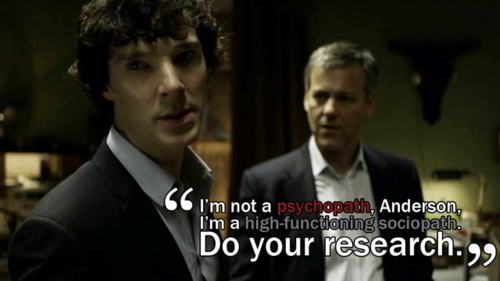We always called that being an adult or, if the group was all male, being a man.
"There’s no one thing that makes a psychopath,” Dutton explains. “You want to think of those traits being like the dials on a studio mixing desk, that you can turn up and down in different situations – if they’re all turned up to maximum, then you’re a dysfunctional psychopath. “Being a psychopath isn’t black and white; it’s a spectrum, like height and weight.”
As one dysfunctional psychopath – who was serving a life sentence for multiple murders – put it to Dutton: “It’s not that we’re bad, it’s that we’ve got too much of a good thing.” How, then, can you act more like a psychopath in your everyday life?
I am thinking this whole being in touch with your feelings, new age sensitive guy thing has gone a bit far. The way to address living in denial of your emotions is not to become ruled by them but rather understand and harness them. If we are ruled by our emotions they have a tendency to drive you off a cliff. If you try to deny them they just drive you over a cliff in a sideways motion.
Consider the problem of when we are forced to decide if a parent or spouse should either be allowed to die or if we should sentence them to years in a nursing home unable to move or interact with the world. Some would call the decision to let their life end, often as they would wish it to end, psychopathic. Some would be wrong it merely an ability to understand and deny the impulse to act for our own selfish need, to not say goodbye to our loved one, and having understood it make a decision in the best interest of our loved one, whatever that decision may be.
 |
| Sociopath or Stoic Sage? |
Mother's die. Projects fail. Wars must be fought. Wars must be resisted. Work must be done even if it rains. Finances are limited and choices need to be made. Should those choices be made based on the tyrannical rule of emotion or rational thought?
Emotions should be accounted for but they should not do the accounting.
The use of the terms psychopath (a person suffering from chronic mental disorder with abnormal or violent social behavior) and sociopath (a person with a personality disorder manifesting itself in extreme antisocial attitudes and behavior and a lack of conscience) have degraded to include anyone who is not whipped this way or that by their emotions. This societal standard is welcomed as a form of progress when it is, in reality, a societal weakness.
In diversity of opinion there is strength but in the name of standardizing psychological health with a certain expression of emotion, we have reduced that strength. The stoic has never really experienced social integration but now we have sought to define, and thereby discredit her, as mentally ill. We'll worship the idealized form on the television screen (especially if they have a British accent) and revile them in our workmates or our politicians.
It could even be argued that feeling the right way, and expressing that feeling has replaced actually doing anything useful. It is alright to impotent, as long as you feel bad about it. Helplessness is not a state to be escaped, but a reason for sympathy. We feel bad not only for the kidnapped girls being sold into a life of rape and servitude, but the first lady as well. Those victims of rape look like her daughters after all.

Here is an idea. Instead of weeping and gnashing of teeth, why don't we do something? Unless, of course, we do not care about these kidnapped girls enough to actually do anything about it, just enough to feel bad about it. But, then let's be honest about that as well. Now we are more likely to act in denial of our own abilities, psychologically hamstrung by overwrought emotions. Who is more useful to society, the self-centered neurotic who is more concerned with their feelings at the plight of these girls or the Son-of-a-Bitch who shows no emotion but is willing to put bullets in chests to bring those girls back to their families? Who would be more useful to these girls?
There is all kind of foolish talk about "what we can learn from psychopaths." The truth is there is a whole lot we can learn from not being immobilized by our emotions. There is power in setting aside our disappointment that the world does not live up to our expectations and conform ourselves to how the world really is. That is not being a psychopath. It is merely stoicism.
No comments:
Post a Comment